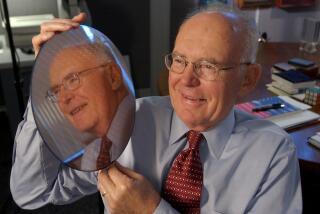Inventor’s Divorce Won’t Be Renegotiated : Courts: Judge dismisses motion by former La Palma man’s ex-wife, who wanted to redo settlement to give her part of his royalties from microprocessor patent.
- Share via
VAN NUYS — The ex-wife of the inventor of the microprocessor, which revolutionized the computer industry two decades ago, lost a bid Tuesday to renegotiate her 1975 divorce settlement to give her a share of the former Orange County man’s nearly $90 million in newfound royalty payments.
A Los Angeles Superior Court judge dismissed a motion filed in January by Priscilla Maystead of Chatsworth, who sought to reopen the terms of her divorce from Gilbert P. Hyatt. She accused him of misleading her about the value of his patent for the microprocessor, or computer on a chip, which he invented in his Northridge family room in the late 1960s.
“If someone happens to succeed decades later, you can’t come back and say you changed your mind,” Hyatt said Tuesday after the hearing.
“I think the judge made up his mind before he heard anything,” countered Maystead. “They just don’t understand abuse. If you’re abused, you can’t fight back effectively.”
In a court battle that lasted two decades, Hyatt--who moved to La Palma in the late 1970s and now lives in Las Vegas--argued that he invented the microprocessor in 1968, before other rivals such as chip industry giants Intel Corp. and Texas Instruments Inc.
The U.S. Patent and Trademark Office granted Hyatt the controversial patent in 1990, entitling him to collect royalties from the industry for 17 years. He has since signed royalty deals worth millions of dollars with major electronics companies.
Scientists at Intel and Texas Instruments consider Hyatt, an unknown inventor who was never able to bring his particular chip design to market, as a thorn in their side; Dallas-based Texas Instruments is appealing the award. Hyatt has said greedy investors drove him out of business in 1971.
But 20 years later, Hyatt had become wealthy from patent royalties. Maystead maintains that this fortune came from work Hyatt performed while they were still married.
She alleged that Hyatt was abusive and bullied her into signing a divorce settlement that left her with their Northridge home, then valued at $30,000, and him in possession of all patents. Their daughter, Beth, 26, appeared in court and backed up her mother’s claims of being physically abused. Hyatt denied the accusations.
Maystead said Hyatt, whom she married in 1959, deceived her when he told her that the patents had unknown value. She also blamed her own divorce attorney for incompetence and deceit in failing to find out how much the patents were worth.
But Judge Robert M. Letteu denied Maystead’s motion, telling her during Tuesday’s hearing that she should have been able to guess the value of the patents because she served as the corporate secretary of Hyatt’s now-defunct Northridge company, Micro Computer Inc. She contended that she was merely a typist.
Letteu also said there was no credible evidence of fraud in the earlier divorce documents where Hyatt had stated the patents had a great potential value.
Letteu sided with Hyatt’s argument that the settlement was fair because Maystead got concrete assets--the house and alimony payments of $200 a month--while Hyatt received only the patents. The patent applications had to be upheld in future court proceedings and were of speculative value at the time of the divorce, Hyatt had argued.
“I see a litigant who signed a contract and something from that became valuable much later and she decides she wants a piece of the action,” Letteu said, explaining his ruling.
More to Read
Inside the business of entertainment
The Wide Shot brings you news, analysis and insights on everything from streaming wars to production — and what it all means for the future.
You may occasionally receive promotional content from the Los Angeles Times.









